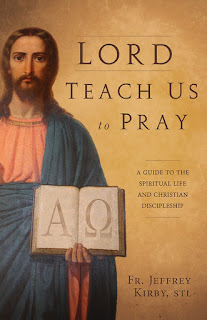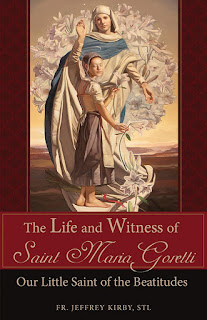We Are the Lord's:
A Catholic Guide to Difficult End-of-Life Questions
ISBN 9781505114614
eISBN 9781505114638
ASIN B07RHW5XK1
This was one of 7 books by Father Kirby that I picked up recently. I picked Kirby’s books up after reading and reviewing several by Father Paul O’Sullivan O.P., it was recommended by someone who enjoyed those reviews and they recommended several titles by Father Kirby. When I looked into the titles available from the pen of Father Kirby, there were several from TAN books that caught my attention. In fact 7 of his books made it onto my wish list almost immediately. This was the second I have read and it will not be the last! This is one of those books that is very countercultural. It is against much of what society believes and teaches. And one of those books I could immediately think of many people who would want to read. An excerpt from the description of this volume states:
“No one likes to think about death and many are not ready for it, either as the patient or a loved one. And yet, the dying process is oftentimes marked by an array of diverse and confusing questions that can catch anyone off guard.
What are we supposed to do?
We Are the Lord's is a succinct, quick-reference guide to difficult end-of-life questions, framed by divine wisdom and Church teaching. Its easy-to-read chapters and question-and-answer format can be a welcomed help to any person or family who are searching for answers during a difficult and traumatic time.
…
Whether as a preparation for a future journey or as an immediate guide for you now, We Are the Lord's is available and ready to help.”
The chapters in this volume are:
Acknowledgments
Introduction
Life as a Gift
Redemptive Suffering
Dying With Dignity
Saved by Hope
Judgment Before God
Principles of Discernment
Specific Moral Questions
The Catholic Funeral
Prayers for the Dead
Our Takeaway
This book will have an immense impact on readers. For some it will affirm what they already believe. For others it will challenge their beliefs. And for some it will upset them greatly because they will not agree with the Church’s teachings on these topics. Father Kirby has written clearly and concisely. The book is easy to read and understand. And I truly believe that anyone who reads it with an open heart and mind will benefit from the reading. Some of the sections I highlighted during my reading of the book are:
“Are you in a dilemma and have to make a pressing end-of-life decision? Are you or a loved one in intense pain or in the dying process? Are you confused or emotionally drained and unsure of how to answer questions about medical treatment? If you find yourself in these situations, my heart goes out to you. This book was written specifically to help with the moral challenges that arise toward the end of life. I pray it brings you helpful information and a sense of peace and comfort during your most difficult moments.”
"On occasion, when the magisterium of the Catholic Church has not given a specific teaching on a moral question, then the book will acknowledge that neutrality (or on-going discernment) of the Church. After this indication, however, the book will seek to provide an opinion and explain it theologically."
"As the author of this book, I write with the precision demanded of theology. I hold a doctorate in moral theology from the Holy Cross University in Rome, a Master of Arts in Philosophy from the Franciscan University of Steubenville, and a Masters in Bioethics from the Queen of Apostles Athenaeum in Rome. My writing, however, also reflects the compassion demanded of a loving shepherd. I’m currently the pastor of Our Lady of Grace Parish in Indian Land, South Carolina, and an adjunct professor of theology at Belmont Abbey College and at Pontifex University. These pastoral positions help me to accompany people in their sufferings and in the dilemmas of life and death."
"Death Is Not the End If you read the introduction, you might’ve noticed the last words were, “let’s begin.” While that might seem like a strange choice of words for a book about end-of-life decisions, it’s actually a fitting play on words since death is not an end but a beginning. Death is the start of a new journey. So … let’s begin."
"The world was created for our good and we were created because of God’s love for us. This point is worth stressing: we are not a something but a someone, and we only exist because God loves us. If God ceased to love us, we would completely disappear, not existing and never having existed. All that we are, including our history, home, and health, dwells in existence because of God’s love."
"Body and Soul As human beings made in God’s image, we consist of a body and a soul. Both our bodies and our souls share in the image of God. The body is not to be diminished, dismissed as some raw matter with no identity, or merely seen as a vehicle that carries our souls around. No, the body shares in our dignity. It must be respected, cared for, and properly esteemed."
"Consequently, human persons are inclined to their own comfort or interests over those of their neighbors, and humanity sees the world as a means of conquest and profit rather than a place calling for care and stewardship. Ever since the Fall, the ability to believe and discern moral goodness through the natural light of reason has become more difficult and strenuous for humanity."
"In taking on human suffering, the Lord Jesus went directly to sin, understood as the source of suffering in human life. In order to take away sin and vanquish its control on humanity, Jesus Christ became sin itself. He sought to destroy this privation of being, and its consequences of suffering and death, from the inside out. In becoming sin, Jesus Christ took upon himself all the sins of humanity throughout time. He endured the totality of human guilt, shame, alienation, grief, confusion, and the full panorama of darkness caused by sin."
"Christian believers are called to this same process of discernment but are greatly aided by the teachings of Jesus Christ and his Church. As disciples of the Lord Jesus, we declare that our lives are not our own: “For to me to live is Christ” (Phil 1:21). And so we are called to give the “obedience of faith” (cf. Rom 1:5; 16:26) throughout our lives, which includes the dying process."
"In the process of receiving sufficient information, the believer or patient of goodwill (or his surrogate) should remember his connection to God. He should prudently weigh all options in light of moral truth and assess whether something is ordinary or extraordinary care. And then, remembering that his life belongs to God, the patient (or proxy) can give his informed consent to whatever will bring about the most good."
"Let the words of some noble Capuchin Franciscans friars, which are contained in the famous “Bone Chapel” of the Immaculate Conception Church in Rome, speak to us today: What you are, we once were; What we are, you will one day be."
As can be seen by those quotes, Father Kirby does not pull any punches. But he also writes with great compassion and mercy. This is an important read.
I have greatly benefited from the first two books by Father Kirby that I have read. I still have 5 from TAN I want to read and have even found a few others I want to read. An excellent volume and one that is much needed today.
Note: This book is part of a series of reviews: 2021 Catholic Reading Plan!
Books by Fr. Jeffrey Kirby STD:
101 Surprising Facts About St. Peter's and the Vatican
A Pastoral Guide to Opening Your Parish
Be Not Troubled
Doors of Mercy: A Journey Through Salvation History
God's Search for Us
Living in Peace
Lord Teach Us to Pray
Luke: The Gospel of Mercy
Thy Kingdom Come
…








No comments:
Post a Comment